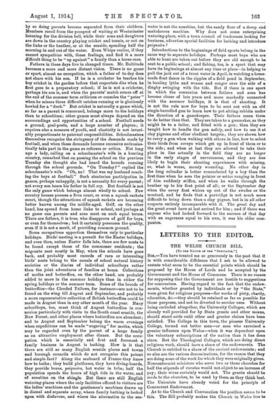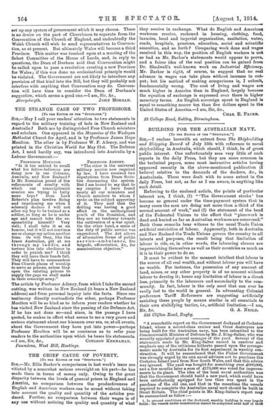LETTERS TO THE EDITOR.
THE WELSH CHURCH BILL.
[To TUS EDITOR Of ras "SPECTATOR."] Sia,—Yon have treated me so generously in the past that it is with considerable diffidence that I ask to be allowed to restate what seem to be the essential points which should be proposed by the House of Lords and be accepted by the Government and the House of Commons. There is no reason for supposing that the Government are hostile to suggestions for concessions. Having regard to the fact that the endow- ments, whether granted by individuals or by "the State," were given for religious purposes—for works of piety, charity, education, &c.—they should be retained as far as possible for those purposes, and not be diverted to secular uses. Without being excluded altogether, the University Colleges, which are already well provided for by State grants and other means, should stand aside until other and greater claims have been satisfied. The College in this town, the pioneer University College, turned out better men—or men who exercised a greater influence upon Wales—when it was dependent upon the voluntary subscriptions of the nation than it has done since. But the Theological Colleges, which are doing direct religious work, should have a share of the endowments. The Church is entitled to a share of the ancient endowments ; and so also are the various denominations, for the reason that they are doing some of the work for which they were originally given. Nonconformist ministers who serve two or three churches for half the stipends of curates would not object to an increase of pay; their wives certainly would not. The grants should be made to the churches, to be used by them as they think best. The Unionists have already voted for the principle of Concurrent Endowment.
As to the Church and Convocation the position seems to be this. The Bill probably makes the Church in Wales free to set up any system of government which it may choose. There is no desire on the part of Churchmen to separate from the Convocation of the Church of England, and undoubtedly the Welsh Church will wish to send representatives to Convoca- tion, as at present. But ultimately Wales will become a third Province. This matter was touched upon at a meeting of the Select Committee of the House of Lords, and, in reply to questions, the Dean of Durham said that Convocation might be called upon to pass a resolution creating a new Province for Wales ; if this was done no ecclesiastical principle would be violated. The Government are not likely to introduce any provision of that kind into the Bill, but they will probably not interfere with anything that Convocation may do. Convoca- tion will have time to consider the Dean of Durham's suggestion, which seems a good one.—I am, Sir, &c.,



































 Previous page
Previous page